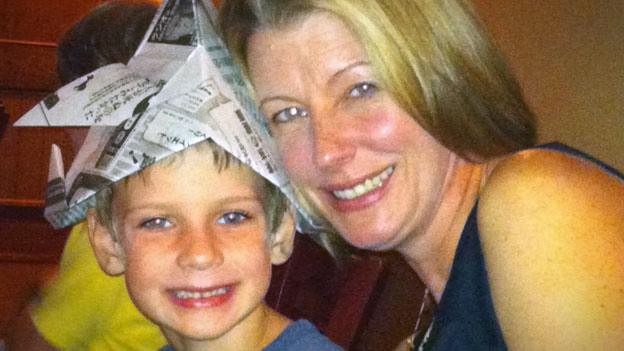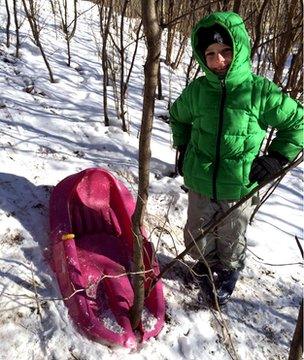US children learn 'lockdown drill'
- Published

Many US schools have tightened security since the Sandy Hook massacre of 2012. Safety drills are becoming as common as fire drills but they can prompt difficult conversations at home.
My seven-year-old is a chatterbox, and as the youngest of three boys, he is always keen to be heard. Little in his life goes unreported. Every day has a banner headline.
So he could not wait to tell me about the safety drill he and his classmates had practised.
"It is in case someone has a bad day," Ben announced with gravity, "we huddle with our teachers and keep quiet until the danger outside has gone away."
"There is no danger inside," he explained for emphasis, gazing intently at me with his big blue eyes. I smiled encouragingly, while wincing inwardly, and rapidly changed the subject.
The thought of my children learning how to behave in case there is a gunman on the rampage is deeply unsettling. But for schools across America, the lockdown drill has become a grim necessity.
Although statistically the number of school shootings in the US has remained steady since the mid-1990s, they are a disturbing reality of American life.
Since September there have been 11 school shootings, and that does not even include shootings on college campuses.
In New Mexico, 12-year-olds have threatened their classmates with guns. In Nevada the maths teacher who confronted a middle-school shooter last November was shot dead.
The most chilling school shooting of all was in December 2012. Twenty first-grade students at the Sandy Hook elementary school in Newtown, Connecticut, were killed by Adam Lanza, who shot his mother and six adults at the school before taking his own life.
The scale of this shooting was so horrifying, and the age of the children so heartbreakingly young, that it led to a push for national gun control which ultimately failed to get through Congress.
I reported on the aftermath of the Newtown shootings, one of the more painful assignments of my career.
Christmas trees for the 20 dead children lined the street by the school - ornaments decorated by friends and family described six- and seven-year-olds who loved football, horses, and Santa Claus.
The BBC has found that at least 130 US schools went into lockdown in a month because of a perceived threat. Is it panic - or preparedness?
The temporary morgue parked near the scene of the shootings was a particularly upsetting sight - the thought of the dead children inside, the same age as my youngest, was hard to contemplate. It was impossible not to wonder how I would cope if it was my child inside that morgue.
Since Newtown, many schools have adopted safety plans. Metal detectors, surveillance cameras and fences have become a fact of life.
All three of my children now practice safety drills - and the school is careful to let parents know in advance in case the topic comes up at home.
One parent, echoing my own feelings, told me it breaks her heart to have her boisterous, talkative five-year-old learning how to hide from a gunman.

Laura's seven-year-old Ben and his classmates now have regular safety drills
Another mother questioned the need for this kind of drill, regarding it as an overreaction to an event that is still very rare.
We all wonder what impact this has on our children and if it makes them fearful. But most parents see the drills as a necessary feature of school life which could save lives.
Meanwhile efforts to bring about national gun control laws have stalled. At the State of the Union address last month, President Obama mentioned gun control only in passing. Last year it was the emotional centrepiece of his address.
I try to downplay the topic with my children - two of the boys have not even mentioned the drills they have done at school. It is little Ben who has reflected the most on the subject.
I tell myself that even though there are almost as many guns in the US as there are people - in New York gun control is strict and the police are close by. It would be difficult for a gunman to get into a New York school unseen, I rationalise.
"Do you think anyone will ever have a bad day near me?" asked Ben recently, looking up from his elaborate drawing of dragons.
"No," I said firmly, crossing my fingers and speaking in my most confident and reassuring manner, "you do not need to worry about that, it will never happen."
Apparently satisfied with that answer, he returned to his drawing, while I turned away, my eyes brimming with tears.
From Our Own Correspondent, external: Listen online or download the podcast.
BBC Radio 4: Saturdays at 11:30 and some Thursdays at 11:00
BBC World Service: Short editions Monday-Friday - see World Service programme schedule.
Follow @BBCNewsMagazine, external on Twitter and on Facebook, external